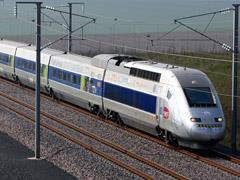
FRANCE: An agreement confirming the public financing package for LGV Bretagne - Pays de la Loire was signed in Rennes on July 12 by Transport Minister Thierry Mariani, RFF President Hubert du Mesnil and representatives from the Bretagne region, Pays de la Loire and the départements of Côtes d'Armor, Finistère, Ille-et-Vilaine, Morbihan, Pays de Saint-Malo et Rennes Métropole.
The agreement provides a fixed sum of €3·3bn towards the project, including a contribution of €1·4bn from RFF, amounting to almost 42% of the total. The remaining 58% will be provided by the national government through its transport infrastructure financing fund AFIFT and by the regional authorities in proportion to local benefits; Bretagne will contribute 19·7% and Pays de la Loire 2·7% of the total. The project has already benefited from €11m of European funding.
According to RFF, the signing of the funding agreement is the final step to be taken before it can sign the PPP concession with preferred bidder Eiffage Rail Express. Eiffage is already finalising the detailed design of the line and is undertaking consultation with the local authorities ahead of construction. Major works are expected to start in 2012 and be completed by the end of 2016.
The project will extend the 180 km Paris - Le Mans branch of LGV Atlantique, which opened in 1989, by a further 214 km to Rennes, cutting 40 min from Paris - Rennes journey times.
A separate funding agreement signed at the same time covers the 3·6 km connection from the new line to the existing route between Le Mans and Angers at Sablé-sur-Sarthe, which will reduce Paris - Nantes journey times by around 10 min.
Described as a 'strategic project for western France', the new line is expected to boost transport links to Bretagne and Pays de la Loire, improving their access to major European centres as well as releasing capacity on the existing lines for freight and improved regional passenger services.
Environment Minister Nathalie Kosciusko-Morizet welcomed the signing of the agreement as a key step in the government's commitment to develop a further 2 000 km of high speed line by 2020 under the Grenelle de l'Environnement programme.

















